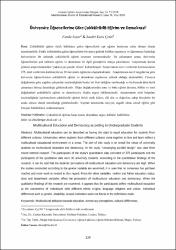Üniversite Öğrencilerine Göre Çokkültürlü Eğitim ve Demokrasi
Abstract
Çokkültürlü eğitim farklı kültürden gelen öğrencilerin eşit eğitim haklarına sahip olması olarak tanımlanabilir. Farklı kültürlerden gelen öğrencilerin bir araya gelerek birlikte yaşamaya ve öğrenmeye başladığı üniversiteler bir anlamda çokkültürlü eğitim ortamını yansıtmaktadır. Bu çalışmanın amacı üniversite öğrencilerinin çok kültürlü eğitim ve demokrasi ile ilgili görüşlerini ortaya çıkarmaktır. Araştırmada karma yöntem araştırmalarından “yakınsayan paralel desen” kullanılmıştır. Araştırmanın nicel verilerinin katılımcılarını 375, nitel verilerinin katılımcılarını 30 üniversite öğrencisi oluşturmaktadır. Araştırmanın nicel bulgularına göre üniversite öğrencilerinin çokkültürlü eğitim ve demokrasi algılarının yüksek olduğu söylenebilir. Cinsiyet değişkenine göre yapılan çalışmalar incelendiğinde henüz bir fikir birliğine varılmadığı ve bu konuda daha fazla çalışmaya ihtiyaç duyulduğu görülmektedir. Diğer değişkenlerden anne ve baba eğitim durumu, bölüm ve sınıf değişkenleri çokkültürlü eğitim ve demokrasiye ilişkin algıyı etkilemektedir. Araştırmanın nitel bulguları incelendiğinde katılımcıların çokkültürlü eğitimi farklı etnik köken, dili din ve değerlere sahip bireylerin bir arada olması olarak tanımladığı görülmektedir. Yapılan tanımlarda cinsiyet, engelli olma, cinsel eğilim gibi bireysel farklılıklara rastlanmamıştır. Multicultural education can be described as having the right to equal education for students from different cultures. Universities where students from different cultures come together to live and learn reflect a multicultural educational environment in a sense. The aim of this study is to reveal the views of university students on multicultural education and democracy. In the study "converging parallel design" was used from mixed method research. The participants of the study's quantitative data consisted of 375 participants and the participants of the qualitative data were 30 university students. According to the quantitative findings of the research, it can be said that the students' perceptions of multicultural education and democracy are high. When the studies conducted according to the gender variable are examined, it is seen that no consensus has yet been reached and more work is needed in this regard. From the other variables, mother and father education status, class and department variables affect the perception of multicultural education and democracy. When the qualitative findings of the research are examined, it appears that the participants define multicultural education as the coexistence of individuals with different ethnic origins, language religions and values. Individual differences such as gender, disability, sexual orientation were not found in the definitions made.


















